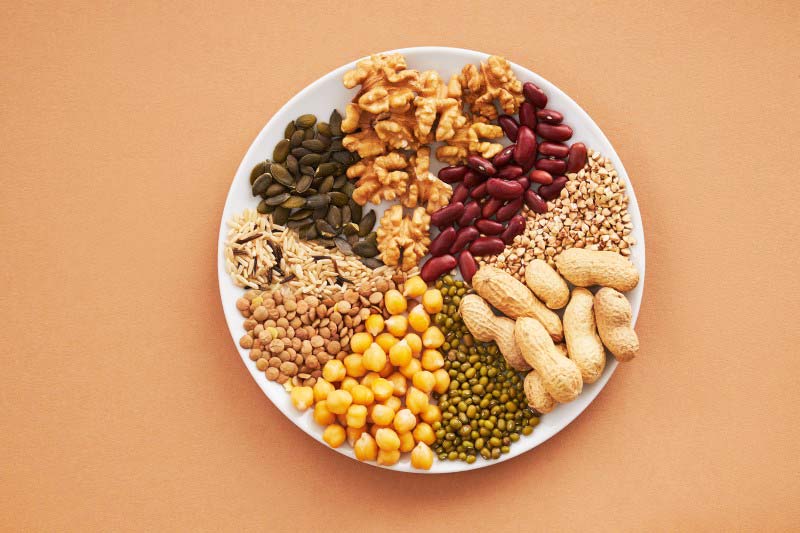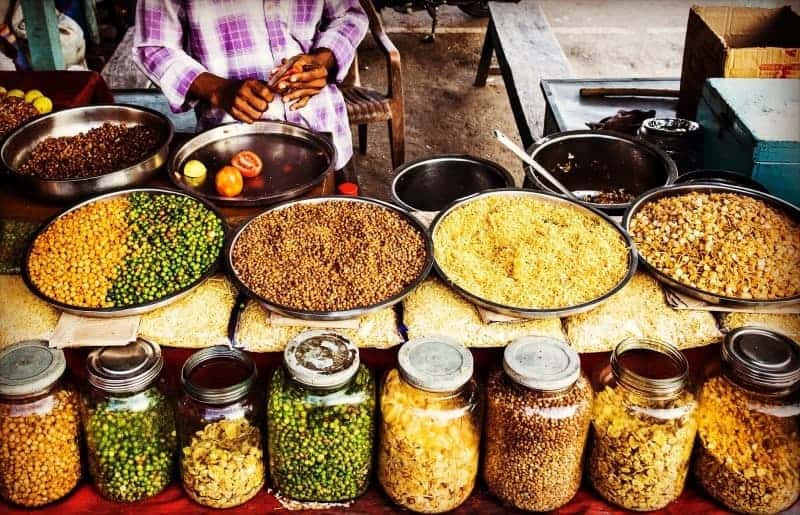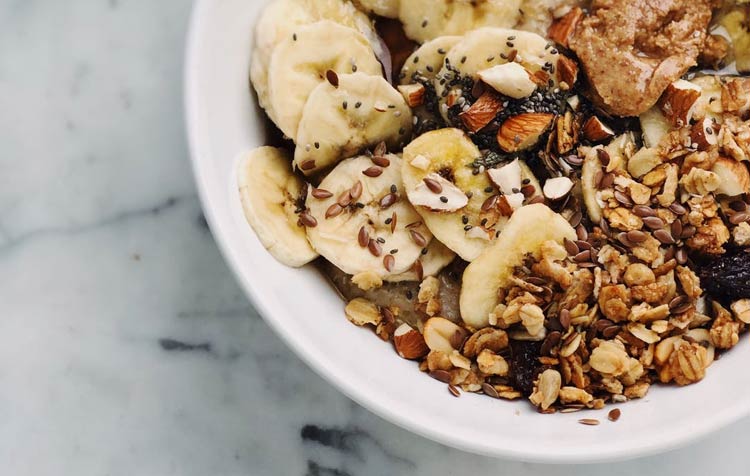In this post, you'll learn the most important information about protein in general and a plant-based diet in particular. First, we'll dispel a few nutrition myths, then we'll move on to protein requirements, the function of protein in the body, the distinction between animal and plant protein sources, the best plant protein sources, and the risk of protein deficiency.
In advance a short Table of contents for this article:
- Misconceptions and prejudices
- Protein requirement
- Differences animal and vegetable protein
- Plant foods with proteins
- Protein deficiency (recognize and avoid)
- Closing words
Misconceptions and prejudices about proteins in vegan diets
There are many different Prejudices regarding vegan nutrition. Therefore, let's start with these nutrition myths, to each of which I will give a clear and scientifically based answer below.
"Without animal products, you're missing protein - it's not healthy."
The German Nutrition Society has defined protein as a potentially critical nutrient in its position paper on vegan nutrition.1 This is because beef, chicken, and pork are full of protein, and for many people, meat is the largest source of protein. However, there are countless plant foods that are just as high in protein as meat. These include especially Legumes, whole grains, nuts and seeds.
Many different studies have already confirmed that a purely plant-based diet can also meet the protein requirement with a sufficient calorie intake. This is also supported by the position paper of the American Dietetic Association and Dietitians of Canada confirmed, in which a balanced vegan diet as healthy, (protein) meeting demand and beneficial for health is defined.2
"Our bodies need meat to perform in sports."
I used to think that you have to eat meat if you do a lot of sports. But if you do a little research and look around at the athletic elite, you'll usually find a lot of vegan high-performance athletes. This is because we can also absorb all nutrients from plant sources - including protein.
Ultramarathon runner Scott Jurek, tennis stars such as Venus Williams or Novak Djokovic, ex-boxer David Haye, strongman Patrik Baboumian, Formula 1 record world champion Lewis Hamilton, UFC fighter Nate Diaz and professional soccer players such as Sergio Agüero, Hector Bellerin or Jermain Defoe are among the list of the vegan professional athlete.
In addition, you can still learn about performance and protein on a vegan diet with the movie "The Game Changers". The American and Canadian nutrition societies confirm that a balanced vegan diet also meets the needs of athletes is.2
Tip: More recommended Documentaries about veganism and factory farming can be found in the linked article.

"Vegetable protein does not contain all the amino acids and is therefore inferior".
The statement that plant foods do not contain all amino acids is false. However, it is true that sometimes the amino acid distribution more unfavorable than animal protein sources. However, you can compensate for this by cleverly combining foods to balance the amino acid ratio.
For example, legumes contain a lot of lysine but little methionine, while it's the other way around for grain products. Therefore, it's great if you eat both whole grains and legumes throughout the day. For example, an Ayurvedic dish that combines legumes and grains is Kitchari. With this you can ideally absorb proteins on a vegan diet.
Notice: A very balanced amino acid ratio, as well as many other micronutrients are contained in hemp protein, a particularly good vegetable protein source.
How high is our protein requirement actually?
The daily protein requirement depends on one's own body weight. Therefore, it is measured in grams per kilogram of body weight (g/kg). According to the German Nutrition Society, the protein requirement is as follows 0.8 g/kg per day.3 Thus, for calculation simply multiply the body weight by the factor 0.8. This means that a man weighing 80 kilograms should eat 64 grams of protein per day.
The World Health Organization and the European Food Safety Authority have defined the protein requirement slightly higher at 0.83 g/kg.4,5 The Australian Health Society also differentiates protein intake between men and women. A daily requirement of 0.84 g/kg has been set for men and 0.75 g/kg for women.6
For Sportsmen and athletes an increased protein intake is recommended. This is set by the National Institutes of Health at 1.2-2.0 g/kg bw.7 For Pregnant the requirement increases to 1.0 g/kg daily and with breastfeeding women even to 1.2 g/kg. For seniors aged 65 and over, an increased protein intake of 1.0 g/kg is also recommended.3
Notice: Since there is no protein store in the body, daily intake is important.
What do we need protein for?
Protein is needed in the body for many different functions. Here I would like to briefly summarize the most important tasks for you8:
- Function of the immune system
- Cell building of muscles, bones, etc.
- Structure of enzymes and hormones
- Transmission of nerve impulses
- Transport of oxygen and fats
- Energy source
- Regulation of the water balance
How do animal and plant proteins differ?
One should basically always see the whole food and not just reduce it to the protein content. A detailed comparison of the nutritional values of tempeh and beef or red lentils and beef can be found in the Contribution legumes instead of meat.
Plant-based proteins also offer some advantages, for example, many vegan protein sources are easier to digest. In addition, animal sources of protein are suspected of increasing the Risk of fatal diseases of civilization like cancer or Cardiovascular diseases to increase8 Furthermore, animal protein contains more purine, which can lead to hyperacidity and gout.9
Plant foods with proteins
Especially good sources of protein are legumes, nuts, seeds and whole grains. Therefore you will find in this list high quality vegetable protein sources particularly many foods that belong to these groups:
- Pumpkin seeds (35 g protein per 100 gram)
- Hulled hemp seeds (30 g protein per 100 gram)
- Peanuts (25 g protein per 100 gram)
- Cashews (20 g protein per 100 gram)
- Tempeh (14 g protein per 100 gram)
- Tofu (13 g protein per 100 gram)
- Oatmeal (13 g protein per 100 gram)
- Lenses, Cooked (10 g protein per 100 gram)
- Chickpeas, cooked (8 g protein per 100 gram)
- Wholemeal pasta, cooked (6 g protein per 100 gram)
The list is only exemplary and not exhaustive. There are many more plant-based foods that are high in protein. Instead of limiting yourself to just a few foods, it is best to simply Food groups legumes, whole grains, nuts and seeds regularly in your diet integrate. In Contribution to vegetable protein sources you can learn even more about protein on a vegan diet.
Detect, correct and avoid protein deficiency
According to the large-scale National Dietary Survey II, about 11 percent of men and 15 percent of women do not meet the recommended reference values for protein intake.10 Nevertheless, protein deficiency is virtually non-existent in industrialized countries and actually only occurs in developing countries because the supply of food is limited and therefore too little protein is consumed. This is because a slight undershoot of the reference values does not yet lead to a deficiency, since a safety margin is already factored into the reference values.
A Supplementation with protein is therefore not absolutely necessary. However, it can be useful for practical reasons due to an increased protein requirement or to make sure that you get enough protein even on a vegan diet. In that case, I recommend a high-quality, whole-food, and organically produced protein powder that has an easily digestible, fermented protein as its base. Added sugar or artificial sweeteners should not be on the list of ingredients. A corresponding Protein powder you get here*.
Notice: By the way, I myself have already tried the varieties Salted Maca Caramel, Acai Blueberry, Banana & Cinnamon and Madagascar Vanilla from the vegan Perform Protein. My favorite is Salted Maca Caramel. Vivolife also grows a tree for every order, packages the powder in 100 percent recyclable packaging, and offsets all CO2 emissions.
No protein deficiency is expected in a balanced, vegan diet

By eating a well-planned, plant-based diet, protein deficiencies or health drawbacks are virtually eliminated. On the contrary, plant-based protein sources do offer some advantages over animal-based protein, even if you are refrain from substitute products like.
If you eat a balanced diet and include legumes, whole grains, and nuts and seeds in your diet, you will get enough protein on a vegan diet.
I hope that I was able to help you with this post on protein requirements for a purely plant-based diet. Do you have any questions or suggestions? Then feel free to write me a message in the comments.
All the best,

PS.: That Veganism basically not healthy is also one of the many prejudices. In the linked article, I show you why the opposite is also the case. Have fun!
References:
1 Deutsche Gesellschaft für Ernährung e. V.: Supplement to the position of the German Nutrition Society regarding population groups with special nutritional needs, https://www.dge.de/wissenschaft/weitere-publikationen/dge-position/vegane-ernaehrung/?L=0 [09.08.2021].
2 American Dietetic Association, Dietitions of Canada (2003): Position of the American Dietetic Association and Dietitions of Canda: vegetarian diets. In: Journal of the Academy of Nutrition and Dietetics, 103 (6), S. 748-765. Online: https://jandonline.org/action/showPdf?pii=S0002-8223%2803%2900294-3. [09.08.2021]
3 Deutsche Gesellschaft für Ernährung e. V.: Protein, https://www.dge.de/wissenschaft/referenzwerte/protein/?L=0. [09.08.2021]
4 World Health Organization: Protein and Amino Acid Requirements in Human Nutrition, https://apps.who.int/iris/bitstream/handle/10665/43411/WHO_TRS_935_eng.pdf?ua=1 [09.08.2021].
5 European Food Safety Authority: Scientific Opinion on Dietary Reference Values for protein, https://efsa.onlinelibrary.wiley.com/doi/epdf/10.2903/j.efsa.2012.2557. [09.08.2021]
6 Australian Government. National Health and Medical Research Council: Nutrient Reference Values for Australia and New Zealand, including Recommended Dietary Intakes. Protein, https://www.nrv.gov.au/sites/default/files/content/n35-protein_0.pdf. [09.08.2021]
7 National Institutes of Health. Office of Dietary Supplements: Dietary Supplements for Exercise and Athletic Performance. Fact Sheet for Health Professionals, https://ods.od.nih.gov/factsheets/ExerciseAndAthleticPerformance-HealthProfessional/#protein. [09.08.2021]
8 Center for Health: Animal Protein Promotes Cancer, https://www.zentrum-der-gesundheit.de/krankheiten/krebserkrankungen/weitere-krebsinformationen/tierisches-protein. [09.08.2021]
9 Zentrum der Gesundheit: Eiweiss - die Grundlage des Lebens, zentrum-der-gesundheit.de/ernaehrung/naehrstoffe/proteine-uebersicht/eiweiss. [09.08.2021]
10 Max Rubner Institute. J. Möhring, H. F. Erbersdobler (2008). National consumption study II - results report part 2. In: Lebensmittel-Warenkunde Für Einsteiger, (Springer), pp. 121-146. Online: https://www.mri.bund.de/de/institute/ernaehrungsverhalten/forschungsprojekte/nvsii/erg-verzehr-naehrstoffe/ [09.08.2021].






